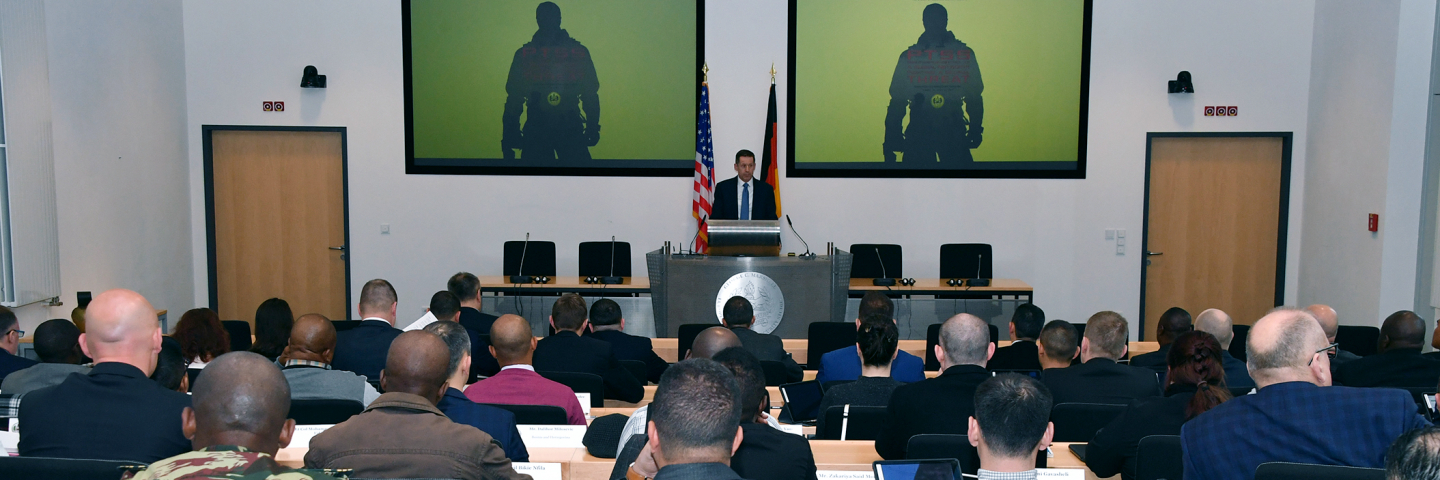
Marshall Center's Counterterrorism Course Teaches Global Professionals to Fight Terrorists at Home
By Christine June
Public Affairs Office
George C. Marshall European Center for Security Studies
GARMISCH-PARTENKIRCHEN, Germany (March 15, 2019) - The George C. Marshall European Center for Security Studies’ Program on Terrorism and Security Studies has gathered 63 counterterrorism practitioners and professionals from 47 countries to learn how terrorism manifests itself today in 2019.
“And more importantly, what do we do about these threats,” said retired U.S. Marine Corps Col. James Howcroft, the PTSS program director. “These professionals from around the world will share their best practices and experiences with each other so when they go home they’re better equipped to deal with terrorism in their own country.”
This iteration began March 12 and will end April 10.
Defending Our Citizens
“Unlike national or regional terrorism studies programs, this is a global course, and we intend to take you to a higher level – to international cooperation,” said retired U.S. Air Force Brig. Gen. Dieter Bareihs, Marshall Center’s U.S. deputy director, during his remarks welcoming the participants to this counterterrorism course.
He explained, “An increasingly globalized problem requires a globalized response – a response that uses best practices shared around the world, combined with local knowledge, experience and culture to create better and more effective strategies to defeat the threat and defend our citizens.”
Bring It Home
Held twice a year, PTSS is a four-week resident program that supports the Marshall Center's increasing emphasis on transnational threats and challenges. The Marshall Center is a 25-year-old German-American security partnership that has produced generations of global security professionals schooled in American and German security policies.
“I look upon the PTSS as sort of a buffet or a smorgasbord of subjects and issues dealing with terrorism and what people are doing about it,” Howcroft said. “Each participants can choose what is applicable and useful for their countries and then bring it home and put it into practice.“
These subjects range from terrorist and counterterrorism strategies to securing borders against traveling terrorists to even, women and terrorism. Teaching these topics are in-house, counterterrorism and security studies experts from the PTSS team, as well as practitioners and experts from national and international, military and civilian agencies such as the U.S. Federal Bureau of Investigation, U.S. Military Academy at West Point, Danish Institute for International Studies, Ministry of National Defense of Niger and even, Facebook.
Many of these subject matter experts presenting in these program, as well as the 28 iterations before, are alumni.
Marshall Center’s Counterterrorism Network
“I think the PTSS network is probably the most important outcome of this program so I bring back alumni to participate in the program as speakers and adjunct professors,” Howcroft said. “We nearly have 2,000 alumni, who share best practices and information, and who work together across borders and across ministries on a daily basis to fight terrorism.”
Howcroft added that this class will have 10 speakers who are alumni. One of those alumni speakers is Special Agent Thomas F. O’Connor, with the FBI’s Joint Terrorism Task Force and who is a PTSS alumnus. During this class, he will be presenting on right-wing terrorism and with his wife, Jean, who is a PTSS alumna and also an FBI special agent, on evidence and prosecution.
“Building a counterterrorism strategy with input from partners from around the globe is an amazing opportunity,” he said. “Implementing it in your home country is a home run.”
Program’s Origins
After 9/11 (Sept.11, 2001 terrorist attacks on the United States), retired U.S. Marine Corps Col. Nichols “Nick” Pratt conceived of, created and implemented the Marshall Center's PTSS. Like Howcroft said, PTSS has almost 2,000 alumni from more than 128 countries.
The first PTSS course was in 2004, and this class is the 29th iteration at the Marshall Center.
The PTSS provides advanced professional education to those charged with understanding and then reducing the scope and capability of terrorism threats.
“These practitioners are usually mid-level officers and officials from a variety of organizations and ministries within their government,” Howcroft said. “I want them to learn from each other what works in their respective countries and then, when they go home, they can choose what’s applicable and useful for them to employ.”